One of the key preoccupations in Prisoner of Love is Genet’s exploration of the ability of language to arrive at a version of truth. Within the first pages, he acknowledges that the reality of the Palestinian Revolution will not be found in attempts to describe it, including his own.
Fourteen years ago, a Palestinian friend from Gaza gifted me a copy of Jean Genet’s Prisoner of Love. It was a birthday gift that was nearly a year late, a fact that sticks in my mind for two reasons. The first is that, when my friend handed me the book in the garden of her Islington house-share, I recall how the warmth of the sun felt youthful and full of promise in that specifically early summer way, whereas my birthday is in late September.
The second reason I remember the lateness of the gift is that, when my friend handed me the book in 2010, I brought its pages to my nose — as I do with almost everything, but especially books — and inhaled deeply. A powerful smell of dead cigarettes wafted from the untouched pages. The book had been sitting in my friend’s bedroom for many months, and she was a smoker who spent her days in London — unemployed, with no work permit, and unable to return to Gaza following the Israeli blockade — lying in bed chain-smoking and reading.
“I think you’ll like this,” she said.
At the time, I hadn’t heard of Genet, and this friend — serious, intellectual, heterosexual — explained that Genet was a famous homosexual playwright and novelist from France, a former sex worker and petty thief who turned into a literary sensation. In the early seventies, Genet spent time with the Palestinian resistance fighters — the fedayeen — in Jordan, a few days that stretched to several years and ignited a lifelong commitment to the Palestinian cause. Prisoner of Love was his final book — a collection of his memories of that period, occasionally juxtaposed with reflections of his time with the Black Panthers in the United States.
Holding the thick book in my hands, I understood then the reason my friend had gifted it to me. This was at the height of the hegemony of Israeli pinkwashing — a time when Israel had aggressively marketed itself on the world stage as a beacon of gay rights, a pantomime performance of western liberalism against a peddled image of the Arab world as its backwards and homophobic shadow. For queer Palestinians, this was a time when our identity was weaponized against us, when even some of my closest anti-imperialist comrades looked at my homosexuality with an air of suspicion. The book’s existence thus served an important purpose. Here was a gay man writing intimately, passionately — and from a queer perspective — about the Palestinian revolution. Even without having yet read it, Prisoner of Love was one of the first affirmations I had that my queerness and my commitment to Palestinian liberation could not just exist side-by-side, they were in fact intricately intertwined.
A few months later, I took Prisoner of Love with me on a road trip from Lebanon to southern Jordan, passing through many of the provincial Levantine towns Genet mentions in the book: Dera’a, Ajloun, Irbid. The book, poetic and complex, meandering and disjointed, was a reliable albeit challenging companion on the journey. Eschewing narrative, story, momentum, Genet instead opts for truncated memories and meditations that bleed and burn into one another, ricocheting through time and space.
Though the book is primarily set in the two years Genet spent with the fedayeen in the refugee camps between 1970 and 1971, it is by no means exclusively so. A single sentence can begin in one time and place and end a decade later in a city hundreds of miles away. In the words of Edward Said, to read Prisoner of Love is “to accept the utterly undomesticated peculiarity of [Genet’s] sensibility, which returns constantly to that area where revolt, passion, death, and regeneration are linked.”
I was less than half-way through Prisoner of Love when I landed back in London, and promptly returned the book — unfinished — to my bookshelf, where it languished for the next fourteen years. Though I could not foresee a time when Prisoner of Love would rise to the top of my ever-growing to-read pile, I kept hold of the book. Over time, it began to feel archaic, the simmering fury that I remembered seeping through the ink on its pages reflecting the melancholic rage of the end-life rather than the youthful rage that propelled my activism during the Arab Spring. I recalled little from the book other than vague memories of a mother and her son — Hamza — with whom Genet was enraptured, perhaps even in love.
Over the years, I sometimes picked up my copy and flicked through the pages. The lingering smell of smoke triggered two memories that played alongside each other like reels from a home movie: the first, reading the book squeezed between strangers in the backseat of a smoke-filled taxi during my road trip through the Levant, and the second, my friend’s garden the day she gifted me the book, where we had sat smoking cigarettes and talking about revolution and Palestine with the full force of our powerless youth. In both memories, cigarette smoke featured heavily, the same smell that persisted between the pages of the copy of my book, like a stubborn revolution. The smell became so tied to the book that when I came across other copies around the world, I would be surprised that they too did not smell of my friend’s long extinguished Marlboro Reds.
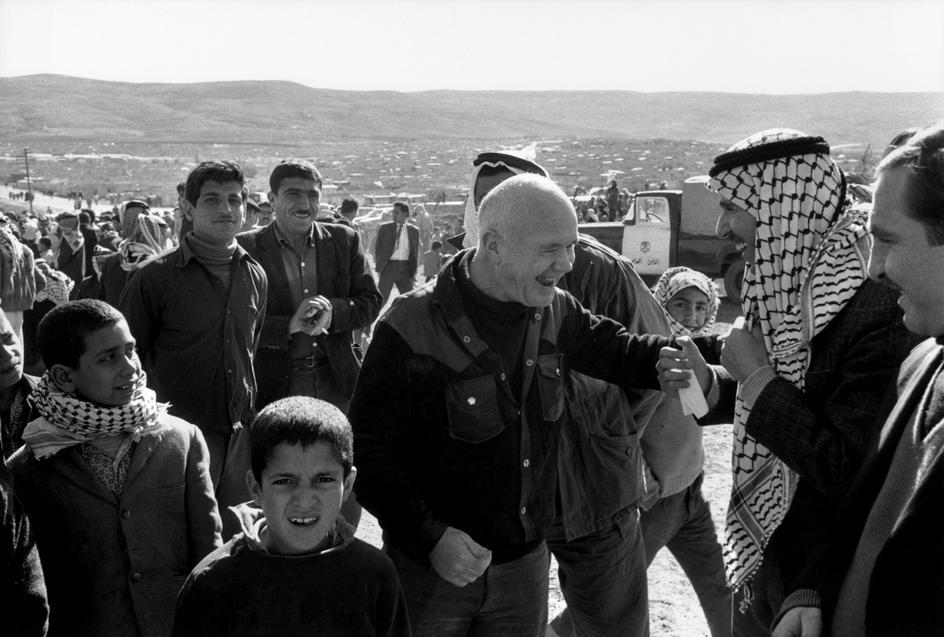
The timing of the book’s writing suggests that Genet’s witnessing of the massacre in Sabra and Chatila — where Lebanese Phalangist forces, under Israeli military oversight, massacred thousands of mostly Palestinians and Lebanese Shiites in two refugee camps in Lebanon — spurred the sudden outpouring of memories that composed the book. Yet in Prisoner of Love, Genet doesn’t dive into details of the massacre (his specific reflections on the massacre are instead captured in his powerful essay Four Hours in Chatila). Perhaps, when the horror is too great, there is comfort in turning to the past, which allows a safe distance from which to observe the present. Perhaps that is also why, amidst the unspeakable horror unfolding in Palestine in the black winter of 2023, I found myself pulling Prisoner of Love from my bookshelf.
Holding the book in my hands, I did what I always do: I brought it close to my nose and inhaled deeply. I was expecting the smell of cigarette smoke to come at me, triggering memories of that road trip, of my friend and our conversations. But the smell of cigarettes was gone. Not just that, but the book’s scent had surprisingly returned to that vague ‘new book’ smell, despite me carrying it across multiple continents over the past decade and a half. I had so closely associated that smell of smoke with my Gazan friend, with Palestine, and it was as if neither had ever existed, like I had simply imagined the whole thing. The thought filled me with both a terrible sadness and an unexpected existential terror. Time is the greatest enemy of Palestinians, and how powerful a force is this enemy, erasing even the most stubborn of smells, the most stubborn of people.
Over the course of the winter of 2023, I spent my days reading Prisoner of Love. The experience of reading Genet’s reflections was like gazing out the window of a high-speed train racing through a landscape of history. Attempts to minutely record every sentence, moment, or incident outlined in this dense, meandering book is not just impossible, it also misses the point. There is no grand narrative to be found in this nearly 500-page genre-defying tome, which is not a memoir or a novel or a piece of political journalism or even a travel book. Rather, it is best to let the cascade of memories and musings wash over you. Some of the terrain is mundane, meandering and repetitive, an agonizing read. But then, a luminous image or sentence jumps out with such profound force that it burns itself into your mind, glowing amidst the humdrum of images that precede and follow it, and you carry this flame inside you for days.
Genet referred to the book as a mirror-memoir, and in many ways, Prisoner of Love tells us more about the author of the work than its purported subjects. It tells us about his relationship to writing, truth-seeking, revolution, memory, and ultimately, the liberation and loneliness of a life lived on the permanent periphery.
“This is my Palestinian revolution, told in my own chosen order. As well as mine there is the other, probably many others. Trying to think the revolution is like waking up and trying to see the logic in a dream.”
Indeed, reading the surreal and meandering reflections in Prisoner of Love — set in the hopeful, revolutionary time of the early ’70s, even as it is steeped in the tragic events of Black September — against the contemporary backdrop of relentless violence, bold-faced lies, and the final rupture of the illusion of a just world order, feels like revisiting a dream. Much like a dream, it is difficult to recount in the aftermath. Images, characters, and ideas disappear under the surface of memory.
One of the key preoccupations in Prisoner of Love is Genet’s exploration of the ability of language to arrive at a version of truth. Within the first pages, he acknowledges that the reality of the Palestinian Revolution will not be found in attempts to describe it, including his own. He goes on to reject any attempt at universal truth-telling or an all-seeing “objective” narrative that can capture a single truth:
“If the reality of the time spent among — not with the Palestinians resided anywhere, it would survive between all the words that claim to give an account of it. They claim to give an account of it, but in fact it buries itself, slots itself exactly into the spaces, recorded there rather than in the words that serve only to blot it out.”
In fact, Genet seems at times resigned to — if not reveling in — the belief that writing is nothing more than a betrayal. “Once we see in the need to ‘translate’ the obvious need to ‘betray,’ we shall see the temptation to betray as something desirable, comparable perhaps to erotic exaltation.”
How to read this in the context of the contemporary Palestinian struggle to assign words and categories to the unspeakable violence in Gaza? Words, language and narrative are mechanisms for deploying power. Palestinians have spent decades learning the language of international law and human rights. But the events since October 2023 have made clear that language alone is not enough. Words, no matter how cohesive and fact-checked and contextualized, can suddenly betray us.
Genet’s reflections on the betrayal of language resonated deeply as I watched the atrocities unleashed by the Israeli machinery of death, a violence so callous and brutal it eclipsed even the most gruesome fiction. Whenever I thought I might have become inured to the violence, a sudden image or video would render me speechless, or else propel a wave of emotion — a swell of grief, rage, helplessness — that would extend from deep inside my stomach and seep through my chest, my arms and neck, and down my legs.
And even when these atrocities were brought to the highest levels of international courts in a desperate attempt to assign words to this violence, just as quickly as a category to describe the horror was bestowed on Palestinian suffering, it was suddenly stripped of any meaning and power.
Writing in February 2024, the Palestinian novelist Adania Shibli notes that “[i]n Palestine/Israel, you grow up realizing that language is beyond being a tool to be instrumentalized to communicate or tell. It can be attacked, it can be broken, and it can be abused. The question is, how can you trust language when it also causes you pain, when it deserts you, and when you must face cruelty alone, speechless?”
In the shadow of the horror unfolding before us, language and words feel unequipped to either capture or help minimize the immensity of grief and fear. It is, quite literally, like bringing a pen to a gun fight.
The ambivalent power of words and narrative are a recurring theme in Genet’s reflections. In a paragraph written more than four decades ago but that could be written, almost word for word, today, Genet writes about the war Israel has waged in the realm of words and language:
“Very smart of Israel to carry the war right into the heart of vocabulary, and annex the words holocaust and genocide. The invasion of Lebanon didn’t make Israel an intruder or predator. The destruction and massacres in Beirut weren’t the work of terrorists armed by America and dropping tons of bombs day and night for three months on a capital with two million inhabitants: they were the act of an angry householder with the power to inflict heavy punishment on a troublesome neighbor. Words are terrible, and Israel is a terrifying manipulator of signs. Sentence doesn’t necessarily precede execution; if an execution has already been carried out, a sentence will gradually justify it. When it kills a Shiite and a Palestinian, Israel claims to have cleansed the world of two terrorisms at once.”
And there is that word, “terrorist,” which Genet had already picked up for examination forty years ago. As an Arab, as a Palestinian, over my lifetime I have watched this word embed itself under my skin. At various points, I often reflected upon the decades of global antisemitic propaganda that preceded the Nazi genocide and wondered, vaguely, whether the decades of Islamophobia would culminate in the same kind of terror. Nonsense, I would assure myself, brushing such thoughts away as paranoid delusions. The world is a very different place now than it was in the mid-20th century. Besides, where would such a genocide take place? Which group of Arabs and Muslims would the axe of decades of dehumanization fall on? I should have known even then that it would be Palestine, the beating heart of the modern world in all its beauty and terror.
There is an unflinching honesty in Prisoner of Love that is both frightening and refreshing. Unburdened as Genet was by performances of positionality and political correctness expected of contemporary writers, he unapologetically positions himself at the center of his own work. For a white French writer who often infused his writing with sex and eroticism, I was prepared to encounter a memoir rife with exoticizing and orientalist imagery. Ultimately, I did not come across grave instances of either. At no point did Genet write about the Palestinians from a position of authority, nor was he at any point at risk of “going native.” And while instances of jarring misogyny occasionally seep through the pages, a searing empathy and love pulses nevertheless in his words throughout. There is no second-guessing, no fear of cancellation, only a raw honesty and love that is thrilling and comforting all at once.
And there is no doubt that Genet loved Arabs, and especially the Palestinians. Whereas he represents the Palestinian resistance with an almost wistful softness, frequently noting the gentle and almost too-peaceful nature of Palestinians, who are more interested in their gardens and their flowers than in their guns, he observes the Black Panthers in a different light, as a more potent, erotic, but ultimately more image-conscious movement, one more preoccupied with imposing a stylistic provocation to White America than viable and concrete political change:
“The Whites’ recoil from the Panthers’ weapons, their leather jackets, their revolutionary hair-dos, their words and even their gentle but menacing tone — that was just what the Panthers wanted. They deliberately set out to create a dramatic image. The image was a theatre both for enacting a tragedy and for stamping it out — a bitter tragedy about themselves, a bitter tragedy for the Whites. They aimed to project their image in the press and on the screen until the Whites were haunted by it. And they succeeded. The theatrical image was backed up by real deaths. The Panthers did some shooting themselves, and the mere sight of the Panthers’ guns made the cops fire. Was the Panthers’ failure due to the fact that they adopted a brand image’ before they’d earned it in action?”
The Palestinians, meanwhile, performed their revolution on the world stage for slightly different purposes. Genet frequently cites a 1974 speech by Yasser Arafat before the UN, where the visibility of Palestinians is part and parcel of the struggle for survival:
“Europe and the rest of the world talk about us, photograph us, and so enable us to exist. But if the photographers stop coming, and radio and television and newspapers stop talking about us, Europe and the rest of the world will think, ‘The Palestinian Revolution is over. America and Israel have settled the matter between them.’”
Politics as theatre is a recurring motif. In an early scene in Prisoner of Love, Genet recounts a post-colonial dance-off between the Jordanian Bedouin army and the Palestinian fedayeen, the former chanting praises to the King of Jordan, the latter responding with praise for Yasser Arafat. Here, the performance is the conduit by which each side asserts their national loyalties: “the dancing was a display, almost a confession, of the femininity that contrasted so strongly with their burly chests.” Later, in Beirut, two Israeli spies undertake an assassination under the guise of a queer performance, “with their arms round one another’s necks, laughing and exchanging kisses.” When the guards shout insults at them, the “two shocking queers” whip out their revolvers and shoot the guards dead. Genet reflects on the rehearsals the two men must have undertaken to carry out this performance, how they must have practiced to “make their caresses plausible…had to get used to kissing and being kissed on the mouth […]. The muscles of their arms and legs, their agility, the innocence and hairlessness of their faces-all had to be brought to perfection.”
But for both the Panthers and the Palestinians, performance is also an act of disruption, a challenging of the hegemonic narratives that thrive on death or permanent invisibility: on the one hand, the myth of White America, on the other, the myth of Israel as the Jewish promised land.
The inclusion of the Black Panthers in a book about Palestine is an apt choice. There is a long history of solidarity between the Black American and Palestinian struggles that continues to the present day. The killing of George Floyd in the US came in the same period as the killing of thirty-two year old special needs student Iyad el-Hallak in occupied East Jerusalem. Not coincidentally, El-Hallak was gunned down by Israeli Occupation Forces (IOF) after reportedly chanting “Black Lives Matter” and “Palestinian Lives Matter.” In a fitting marriage between the two movements, a recurring character in Genet’s memories is Mubarak, a black Palestinian fedayee. In one conversation, Mubarak reflects on how his race is felt by the Palestinian fedayeen, telling Genet: “We can’t exist through our intelligence. We can only tell we exist by getting under other people’s skins.” This appears true for both Mubarak’s blackness and his Palestinianness.
What Genet captures best is the queerness at the heart of both movements. And it is this queerness that Genet is most enraptured with. Affiliating himself with both movements allowed this once-great literary outcast to maintain his alignment with the periphery. Genet himself almost admits as much:
“[W]ould the Palestinian revolution have exercised such a strong fascination on me if it hadn’t been fought against what seemed to me the darkest of peoples? — a people whose beginning claimed to be the Beginning, who claimed that they were, and meant to remain, the Beginning, who said they belonged to the Dawn of Time? To ask the question is, I think, to answer it. Taking place against the background of the Dawn of Beginnings, the Palestinian revolution was no ordinary battle to recover stolen land: it was a metaphysical struggle. Israel, imposing its morals and myths on the whole world, saw itself as identical with Power.”
As Genet posits, the Palestinian predicament is one of being up against not just post-WWII Western ideas of nation-building, but the very orders of God —namely, the biblical decree that the land of Palestine was ordained to the Jews. Is there anything queerer than a struggle that seeks to overthrow the word of God himself?
And more than that, even, is there anything queerer than a revolution yet to be achieved? Genet wrote Prisoner of Love at a time of uncertainty and grief in the Palestine liberation movement. In the shadow of the massacres of Sabra and Chatila and the Israeli invasion of Lebanon, Palestinian liberation seemed more elusive than ever. This elusiveness appealed to Genet, the perennial outcast and a writer forever situating himself in rebellion,. A friend who read the book alongside me remarked that, had the Palestinians achieved freedom in Genet’s lifetime, he would have inevitably betrayed them.
In his reflections on Genet, Edward Said makes note of this, writing that “[m]uch more important than commitment to a cause, much more beautiful and true, [Genet] says, is betraying it, which I read as another version of his unceasing search for the freedom of the negative identity that reduces all language to empty posturing, all action to the theatrics of a society he abhors.” A negative identity here can be understood as one formed in opposition to societal expectations; essentially, a queer identity that situates itself outside of everything, like an audience member who — by their very presence — showcases how in the end all politics is performance, all revolutions merely theatre.
Despite this tension of betrayal, and perhaps because of it, what emerges from Genet’s reflections is a humane portrait of the Palestinian struggle itself. And it is this account of Palestinian revolutionary struggle that feels important in this particular moment in history, where what few attempts to paint “human” portraits of Palestinians does so through victimhood, stripping Palestinians of their revolutionary struggle to make them more palatable — less killable — to the world. Indeed, Gaza today is so often imagined either as a site of Islamic “terror” or one of humanitarian suffering and despair. What is often forgotten about this small strip of land on the Mediterranean is that it is also the birthplace of so much of Palestinian resistance, both violent and non-violent.
Genet’s portrait of Palestinians is not just a celebration of Palestine but a celebration of Palestine’s revolution, the sometimes-violent struggle for liberation that has become integral to Palestinian identity. But, as the scholar Stephen Sheehi notes in his reflection on the disinvitation of Edward Said from the Freud Society of Vienna in 2001 — following an image of Said hurling a rock at an IOF guard tower from southern Lebanon — “the universal humanism of so-called liberal western democracies has no room for worlded humanity, let alone the defiant worldliness, of Palestinians.”
Genet, by contrast, centers this defiant worldliness. In fact, this is the love that he speaks of in the title, a love not for the Palestinians — though there is no doubt he did — but for their revolution, the struggle for an elusive liberation that, yet to be achieved, remains — to appropriate and refashion José Esteban Muñoz’s definition of queerness — a “warm illumination of a horizon imbued with potentiality.” Palestinian liberation exists for us as an ideality that “can be distilled from the past and used to imagine a new future.”
Reading Genet while bearing witness to the atrocities unfolding in the present, the countless images of dead children and mourning parents and torn limbs and soot-covered faces allowed me a sacred space for reflection and memory, to revisit a time half a century ago when a queer French writer bore witness to a different moment in time, one that held seeds of hope that celebrated the revolutionary fire that lived — and still lives — inside the Palestinian people. I felt intimately close to Palestine, not just as a geographical land but as a revolutionary concept, an anti-colonial struggle in all its contradictions and nuances, its beauties and frustrations, its righteousness and its fatal naiveté.



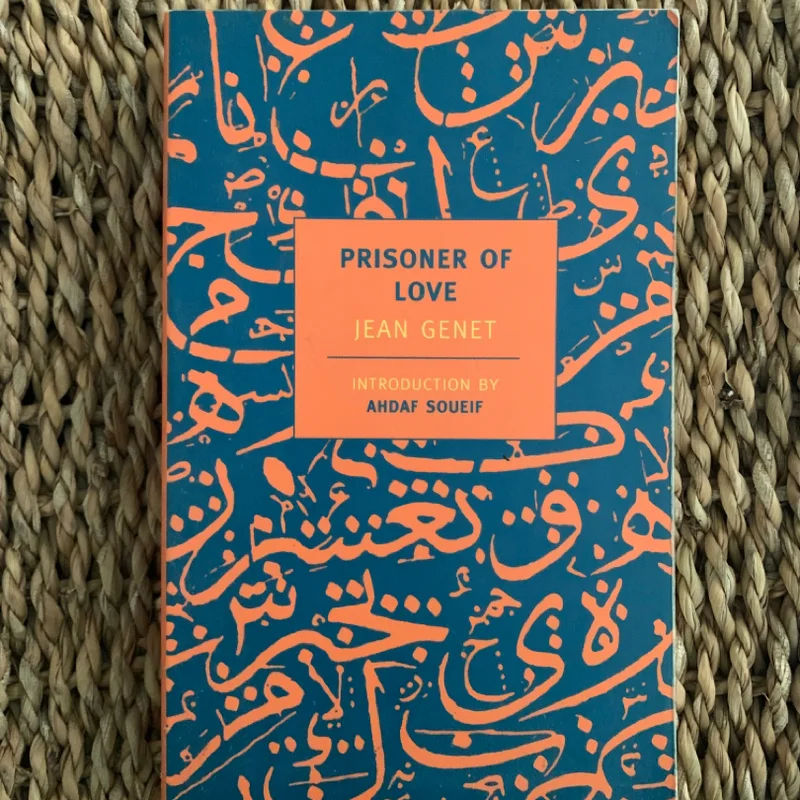
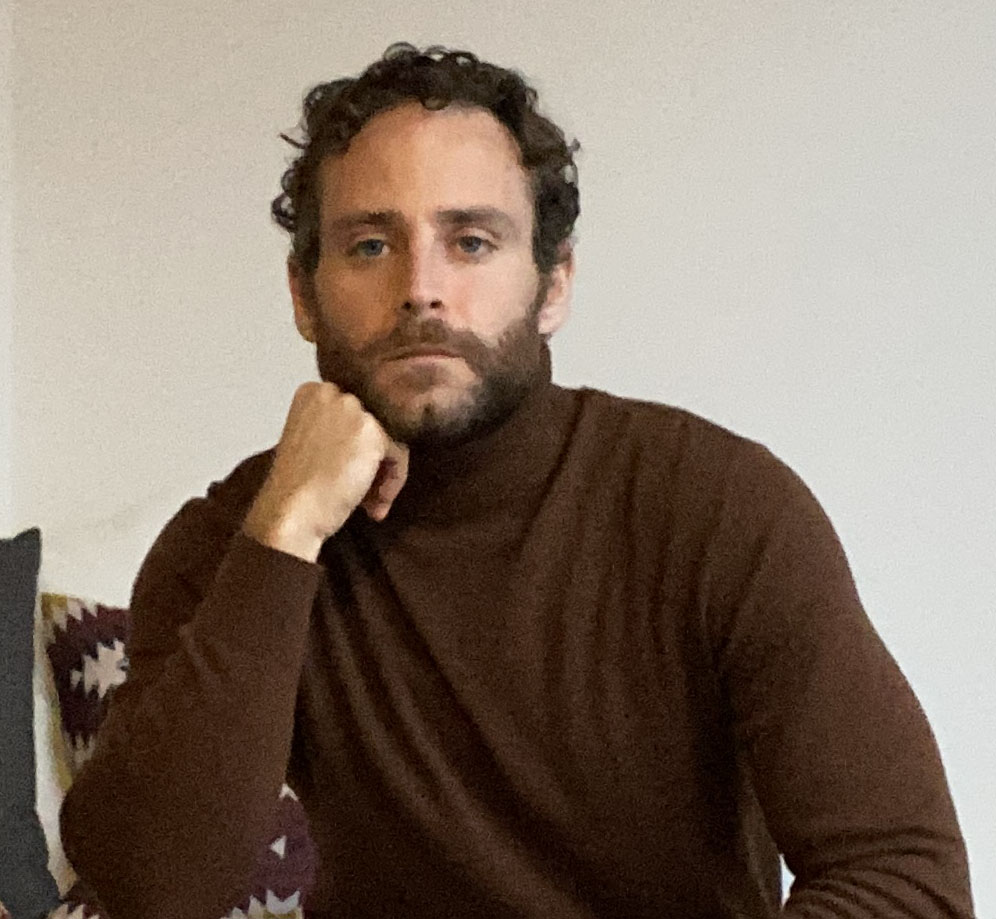




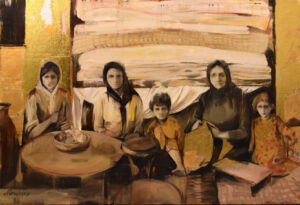


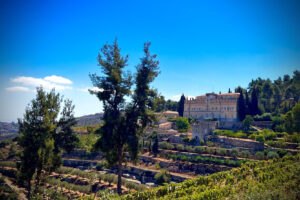











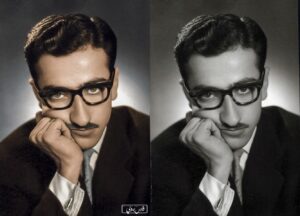






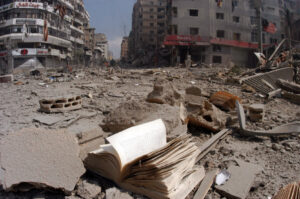


















![Ali Cherri’s show at Marseille’s [mac] Is Watching You](https://themarkaz.org/wp-content/uploads/2025/09/Ali-Cherri-22Les-Veilleurs22-at-the-mac-Musee-dart-contemporain-de-Marseille-photo-Gregoire-Edouard-Ville-de-Marseille-300x200.jpg)







































































































![Fady Joudah’s <em>[…]</em> Dares Us to Listen to Palestinian Words—and Silences](https://themarkaz.org/wp-content/uploads/2024/03/SAMAH-SHIHADI-DAIR-AL-QASSI-charcoal-on-paper-100x60-cm-2023-courtesy-Tabari-Artspace-300x180.jpg)









































































































































































